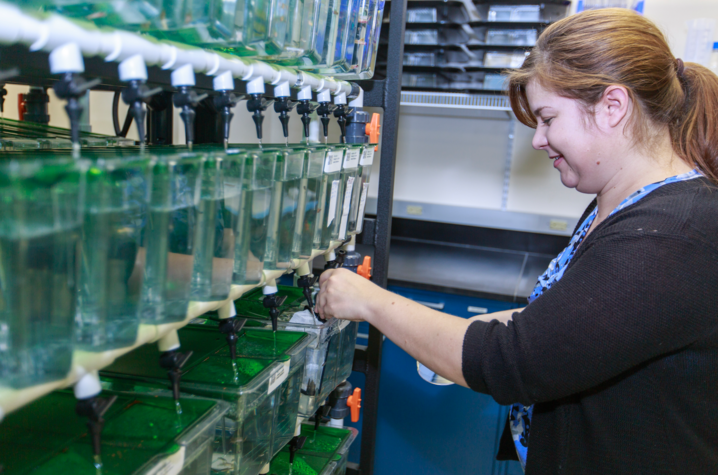Markey's Blackburn Earns NIH New Innovator Award for Cancer Research
University of Kentucky Markey Cancer Center Researcher Jessica Blackburn has earned a prestigious National Institutes of Health's New Innovator Award, a grant totaling $1.5 million over five years to fund pediatric cancer research.
Blackburn, an assistant professor in the UK Department of Molecular and Cellular Biochemistry, runs a basic science laboratory using zebrafish as an animal model. This new award will specifically fund research to find causes of leukemia relapse in three ways:
- Identifying the unique genetic signature of relapse-causing cells, using single-cell sequencing technology in both zebrafish leukemia models and patient samples.
- Discovering how and where relapse-driving cells “hide” from chemotherapy in the body using live animal imaging techniques in zebrafish.
- Finding new drugs that can specifically kill the cancer cells that cause relapse by screening thousands of compounds zebrafish.
Zebrafish labs are far less common than labs that use mice as an animal model of cancer, but Blackburn notes that zebrafish models provide important research advantages, such as in vivo imaging at single-cell resolution and low-cost, high-throughput drug screens, which can complement traditional mouse models.
"The hope for this project is that we will be able to provide new insights the biology of what causes cancer relapse, not only to find better ways to treat it, but to develop treatment strategies that will prevent relapse from happening in the first place," Blackburn said. "I think this work shows that zebrafish models of human diseases – like cancer – are being more widely accepted in the medical fields, and that more people are recognizing the important discoveries that can be made using zebrafish."
The NIH's New Innovator Award was established in 2007 and supports unusually innovative research from early career investigators who are within 10 years of their final degree or clinical residency and have not yet received a research project grant or equivalent NIH grant. It's one of four prestigious awards in the NIH's High-Risk, High-Reward program, which were created to support unconventional approaches to major challenges in biomedical and behavioral research. Applicants of the program are encouraged to think outside-the-box and to pursue exciting, trailblazing ideas in any area of research relevant to the NIH mission.
“I continually point to this program as an example of the creative and revolutionary research NIH supports,” said NIH Director Dr. Francis S. Collins. “The quality of the investigators and the impact their research has on the biomedical field is extraordinary.”
The High-Risk, High-Reward program is part of the NIH Common Fund, which supports a series of exceptionally high-impact programs that cross NIH Institutes and Centers. Common Fund programs pursue major opportunities and gaps in biomedical research that require trans-NIH collaboration to succeed.
